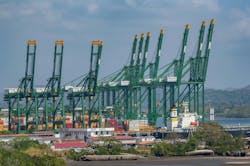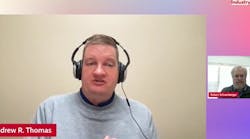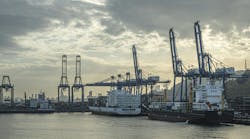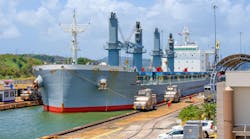Panama to Curb China's Influence Over Canal Following Trump Pressure
Panama has agreed to curb China’s influence over the Central American company, easing tensions following threats from President Donald Trump for the U.S. to retake control of the Panama Canal.
Secretary of State Marco Rubio met with Panamanian leaders Monday to discuss the Canal’s future, and after his visit, Panamanian President Jose Raul Mulino announced plans to drop out of the Belt and Road Initiative, China’s effort to fund building projects throughout the world.
In articles and a video interview with IndustryWeek in January, Canal expert Andrew R. Thomas predicted that Panama would work closely with Trump Administration officials to address American concerns. Thomas noted that after decades of being considered a financial burden to the U.S., the Canal has become vital again in recent years because of increased shipments of U.S. liquefied natural gas (LNG) to Asia.
Before Rubio’s visit, Panama had announced plans to review contracts held by China’s CK Hutchison Holdings to run Atlantic and Pacific Ocean ports to the Canal. Panamanian lawyers filed lawsuits Monday, asking that nation’s Supreme Court to throw out those contracts, which automatically renewed in 2021 for another 25 years.
During Congressional hearings about the Canal last week, several experts testified that CK Hutchison’s contract could violate U.S.-Panama agreements from 1977 – the agreements that turned over ownership of the Canal from the U.S. to Panama –to keep the canal neutral to geopolitical pressure.
“It was a worthwhile visit and very respectful. It is one that I think is going to achieve potentially good things that assuage concerns we have,” Rubio told reporters after arriving from Panama in El Salvador. "Time will tell – we’ll see – but I feel good about it.”
Mulino, speaking to reporters Sunday, said that Panama would not renew its membership in China’s infrastructure funding program and would look whether it can leave earlier than planned. Panama, during Trump’s first term, welcome Chinese spending and cut off diplomatic relations with Taiwan in 2017 to favor partnerships with China.
Rubio said to expect more announcements in the coming days. He suggested an agreement on U.S. concerns over Panama charging military vessels that go through the canal even though Washington is obliged to defend the waterway, the link between the Atlantic and Pacific coasts.
Before leaving Panama, Rubio observed a flight back of Colombians detained as they crossed the Darien Gap, a dense jungle that many migrants pass through towards the United States, through a deportation program negotiated under former president Joe Biden.
About the Author
Robert Schoenberger
Editor-in-Chief
LinkedIn: linkedin.com/in/robert-schoenberger-4326b810
Bio: Robert Schoenberger has been writing about manufacturing technology in one form or another since the late 1990s. He began his career in newspapers in South Texas and has worked for The Clarion-Ledger in Jackson, Mississippi; The Courier-Journal in Louisville, Kentucky; and The Plain Dealer in Cleveland where he spent more than six years as the automotive reporter. In 2014, he launched Today's Motor Vehicles (now EV Manufacturing & Design), a magazine focusing on design and manufacturing topics within the automotive and commercial truck worlds. He joined IndustryWeek in late 2021.
Agence France-Presse
Copyright Agence France-Presse, 2002-2025. AFP text, photos, graphics and logos shall not be reproduced, published, broadcast, rewritten for broadcast or publication or redistributed directly or indirectly in any medium. AFP shall not be held liable for any delays, inaccuracies, errors or omissions in any AFP content, or for any actions taken in consequence.




